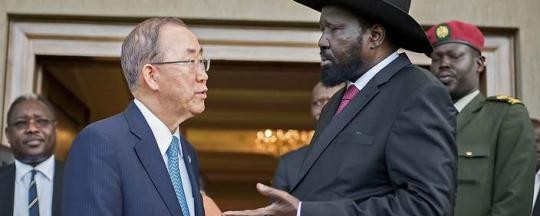U.N. Chief Ban Ki Moon asked for the removal of South Sudan's peacekeeping commander on Tuesday after a damning internal report was released that details how blue helmets failed to protect civilians during clashes between government and opposition forces in July.
U.N Force Commander Lieutenant General Johnson Mogoa Kimani Ondieki of Kenya only took his post late June.
A lack of leadership on the part of senior U.N. officials "culminated in a chaotic and ineffective response to the violence," the executive summary of the report obtained by Radio Tamazuj reads. At least two times, Chinese peacekeepers abandoned some of its defensive positions in PoC 1, and Nepalese peacekeepers were unable to stop looting and showed poor crowd control.
It also takes aim at civilian U.N. officials.
“The Mission’s established culture of reporting and acting in silos inhibited effective action during a period in which swift, joint action was essential,” the report says.
The report emphasized that the responsibility for the protection of South Sudanese civilians rests with the government of South Sudan.
“During the crisis, Government and Opposition forces fired indiscriminately, striking UN facilities and PoC sites, and attacked civilians,” the report says.
The report adds that the mission failed to respond to a raid from government soldiers on a popular hotel called the Terrain Camp. Inside that hotel, the report says that civilians were subjected to "murder, intimidation, sexual violence, and acts amounting to torture perpetrated by armed Government soldiers."
The U.N. mission’s response to the Terrain incident is described in detail. It came at a time when the U.N. had been hit with over 100 rounds small and heavy arms, and two Chinese peacekeepers died.
Residents inside the Terrain camp immediately notified U.N. Security personnel, but “each UNMISS contingent turned down the request, indicating that their troops were fully committed."
South Sudan’s highest ranking General, perhaps Paul Malong, provided a liaison officer to meet with a U.N. quick reaction force near the U.N. House, but “no response team materialized,” the report says.
When three women were left behind at the Terrain camp, one of them called a U.N. security officer, unnamed in the report, and was “dismissive of her appeal for assistance and did not call her back when her phone credit expired,”
Amid reports that U.N. peacekeepers stood by while women were raped and gang-raped by government soliders, the U.N. said that they were unable to verify the allegations.
“These incidents of sexual violence most certainly occurred,” the report emphasizes.
“The UN investigation shows that its peacekeeping mission in South Sudan completely failed to protect civilians in Juba,” said Akshaya Kumar, Deputy United Nations Director for Human Rights Watch. “The mission also needs to make the most out of its civilian component to improve its early warning capacities and political engagement with the parties on the ground."




